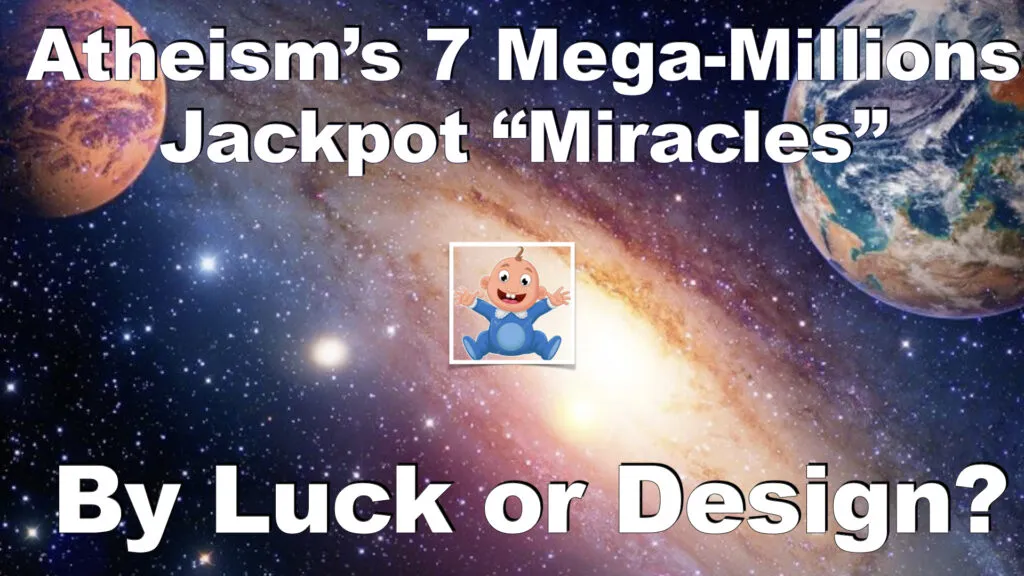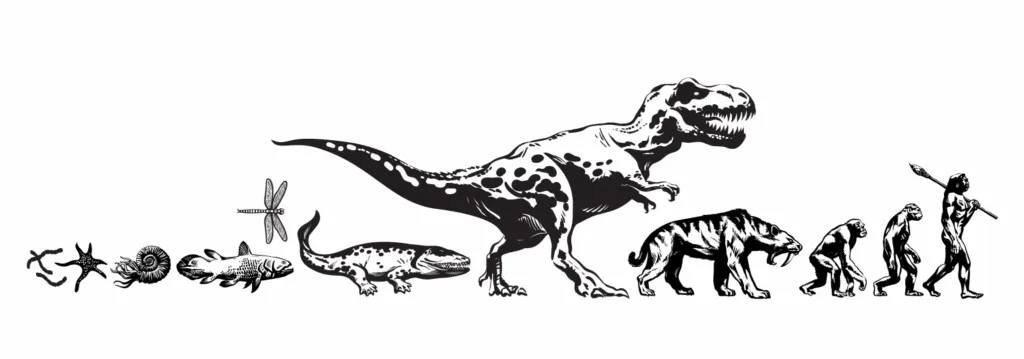Atheism’s 7 Mega-Millions Jackpot “Miracles”

A miracle is an event that cannot be explained by natural law and is therefore considered to be the work of a supernatural agent. But atheists say they don’t believe in miracles. In practice, however, atheists often endow natural law with miraculous powers to avoid attributing the events of creation to an intelligent Designer. Atheism’s seven, mega-lucky “miracle” events are:
1) The origin of universe. Most atheists say “nothing” created the universe at its beginning. Here are two reasons why the atheist’s nothing-coupled-with-luck hypothesis cannot be the reason there is something rather than nothing. (For an in-depth analysis, see Steven Meyer’s book: Return of the God Hypothesis: Three Scientific Discoveries that Reveal the Mind Behind the Universe.)
A.) Common-sense Logic. Incredibly, most atheists believe that our existence ultimately traces back to “nothing” i.e., “something that does not exist” (Websters Dictionary). Richard Dawkins, famous atheist and author of The God Delusion, claims our existence accidentally “…evolved out of literally nothing” at the “big bang” “beginning” when space, matter and time itself began to exist. When atheists make such extraordinary claims they are going “super” “natural”; i.e., above and beyond the laws of physics. Please stop here to analyze this logically. If there ever was a state of absolute nonexistence (no God, time, matter, energy, space, and thus no laws of physics or quantum fields), we wouldn’t exist because non-existence has zero capacity to create, produce or “evolve” into anything. Remember, laws have no causal powers. Laws describe how existing physical things interact. So don’t be fooled by those sophisticated quantum mechanics lectures where professors start off with “something,” which they wrongly call “nothing,” in order to explain everything! For example, professor Lawrence Krauss wrote a book entitled A Universe from Nothing. Krauss posited the theory of quantum gravity as the naturalist answer to the question why there is something rather than nothing. (Krauss later admitted in an interview that physicists have no theory of quantum gravity.) Philosopher William Lane Craig skillfully refuted his book: “Krauss doesn’t have an inkling of the metaphysical and philosophical issues he is trying to address here. If by nothing Krauss means literally non- being, then physics is impotent to explain how being can originate from non being. Physics explains the transition from one physical state to another physical state according to the laws of nature operating on the initial states conditions. But you see in an absolute origination of being from non-being, there is not as if there is an enduring subject. It is not as though something goes from non-being into being. Because in an absolute origination there is just a beginning or origin of something. There is no enduring subject that once had the properties of nonexistence and then has the properties of existence.” (Podcast: A Universe From Nothing. Craig documents the contradictory & misleading ways Krauss defines “nothing.” ReasonableFaith.org.)
B.) The Fine-Tuning Argument: (1) Both sides agree with the scientific data which informs us that our giant, life sustaining universe dangles precisely balanced on a microscopic razor’s edge that is fine-tuned to the precision of 1 in 1010123! For comparison, there are “only” 1080 atoms in the entire universe itself. There are 26 necessary, fundamental constants and quantities perfectly woven into the universe at the beginning. Take the gravitational constant as an example. Gravitational collapse or runaway inflation would have rendered our universe lifeless, if just a tiny fraction of one atom (50 quintillion atoms are in a grain of sand!) had been added or subtracted at creation. (2) Only a supernatural designing Genius could have dialed in our universe’s necessary, life permitting numbers with such staggering precision. (3) Atheistic chance (aka nonexistence) cannot fine-tune one thing. What better explains the finely-tuned engineering wonders of our world like the pyramids, earthquake-proof skyscrapers, jet planes—lucky nonexistence or an intelligent designer?
2) The origin of the stars.

The next just-so story of orginns told by atheists is how our life enabling stars created themselves. Like the big bang itself, star formation is presented to the public as a proven fact on TV and in school text books. Alternative views are forbidden by academia’s anti-scientific cancel-culture. But if you dig deeper into the literature, you will find numerous candid quotes such as these from secular evolutionists that tell quite a different story: “The formation of stars is one of the most fundamental problems in astrophysics…No current model can reproduce all of the observations.”(Ward-Thompson, D., Isolated Star Formation: From Cloud Formation to Core Collapse, Science 4 January 2002: Vol.295, no 552, pp.76-81) “That’s 1022 stars all told. The silent embarrassment of modern astrophysics is that we do not know how even a single one of these stars managed to form. There’s no lack-of ideas, of course. We just can’t substantiate a single one of them.” Martin Harwitt, Book Review in Science, 7 March 1986, p.
3) The origin of planets.

9 billion years after the stars accidentally self-created, planets “decided” to get into the act and self-formed when left over matter from the big bang clumped together into small planetesimals and starting smashing into one another. Then, contrary to the laws of physics, these objects grew big enough amid the high speed destruction for gravity to shape them into large planets. The planet formation narrative is also presented publicly as proven fact in spite of these candid quotes: “Once these planetesimals have been formed, further growth of planets may occur through their gravitational accretion into large bodies. Just how this takes place is not understood.” (Martin Harwit, Astrophysical Concepts, p.553) “How the first stage of this process, primary accretion, works is a fundamental unsolved problem of planetary science.” (Jeff Cuzzi, “Planets the first movement,” Nature 448, 1003 (30 August 2007) “Jupiter is the largest of all the planets. But results in Nature now reveal the embarrassing fact that we know next to nothing about how–or where–it formed.” (Philip Ball, Nature Science Update, 18 Nov 99) For more quotes watch Spike Psarris’ YouTube talk: Science or Storytelling?
4) The origin of life on earth.

1 billion years after the earth created itself, the first self-replicating cell supposedly self-created in the extremely hostile-to-life, early earth’s atmosphere. But the DNA specified information argument disproves this fanciful, naturalistic theory:
(A) An intelligent mind is necessary to program the sophisticated, computer-like code found in the DNA necessary to build the living cells that are more complex than the Space Shuttle.
(B) Such coded information—more complex than any computer software ever designed by man couldn’t have evolved by a mindless, undirected process as atheists claim.
(C) Since no materialistic minds existed at life’s conception, the cells’ programmer must have been a supernatural mind. Our repeated and uniform experience (the scientific method Darwin pioneered) proves complex information is always traced back to a mind. No mind, no complex, specified information. Could chance cause the word “Love” to be etched on the sandy beach shore? “No”, you say, “that would require a mind because of its specified information. Erosion by brush driven waves or lighting strikes for millions of years couldn’t have written it.” Agreed. But there is infinitely more specified information found within one cell than found within the word “Love”. Tellingly, biologist Richard Dawkins admits “nobody” has “any idea how life started” on earth; i.e., “the first, self–replicating molecule.” (Dawkins’ interview with Ben Stein, Expelled: No Intelligence Allowed.)
(5) The origin of consciousness. Chemist Jonathan Safati comments: “Where does subjective consciousness come from? Dawkins see this as the ‘biggest puzzle’ facing biology. Scientists have their ideas, and one of the latest ideas is that consciousness serves as the Wi-Fi network for an assortment of ‘computers’ inside your brain. Come again? That explains where it comes from?” (The Greatest Hoax on Earth? Refuting Dawkins on Evolution, Creation Book Publishers, pg. 27)
(6) The origin of modern man.

In 1859 Charles Darwin wrote The Origin of the Species. He claimed by the mechanism of natural selection acting on random mutations, the first self-replicating cell slowly evolved into all of today’s living creatures—like a single seed becoming a tree with many branches. The first modern humans supposedly evolved 200 thousand years ago along one of these branches. Unbelievably, however, Darwin never addressed the ultimate origin of the species in his book; i.e., how that so-called “first cell” (seed) got here! He just wrongly presumed its naturalistic origin to have a foundation upon which to build his naturalistic theory. Why? On atheism, evolutionists cannot propose a plausible mechanism to explain the origin of the complex, specified information necessary to construct the “first living cell.” For two centuries Darwinists have had no idea how the “first cell” originated or where the missing link is (actually, the whole chain is missing). Yet they call evolution a “fact” in spite of the lowest levels of the fossil record recording the sudden “Cambrian explosion” of complex life forms preceded by no simpler forms. This orchard of life (not a tree!)—confirms God, not chance, “planted” everything simultaneously.
7) The origin of morality —good versus evil.

Our atheist friends also struggle to understand how objective morality came into existence since they view humans as will-less, biological robots. Morality and free will must be illusions since we are just highly evolved animals. Indeed, how can morality exist in the soulless, dog-eat-dog, Darwinian, survival-of-the-fittest world? On this point evolutionists are often consistent. Richard Dawkins said: “…there is at bottom, no design, no purpose, no evil and no good…We are machines for propagating DNA…” (The Blind Watchmaker, Norton & Company, Inc. pg. 133) Jerry Coyne calls us “robots made out of meat.” Anthony Cashmore said: “We have no more free will than a bowl of sugar.” Wrong! We humans are endowed with a soul that teaches basic things like murder, rape and theft are evil crimes that should be punished. But where did this moral code come from if naturalism, by definition, cannot provide it? Is it from above?
It’s Either Intentional Design or Lucky Accidents

The odds against all 7 events of creation being accidental are astronomical. They are infinitely more remote than the same individual winning, say, the 700 million lottery jackpot 7 times in a row. Yet even the lottery analogy fails to truly express the extreme, explanatory powerlessness of the atheist’s naturalistic origins hypotheses. Because intelligent minds designed the lottery, there is a 100% chance some “lucky” person will win. But what are the odds of winning the jackpot if people and the lottery didn’t exist? Zero. What are the odds of atheistic nonexistence hitting the miracles of creation jackpot one time, let alone the necessary “Mega 7”? Zero. It is true that naturalism and super-naturalism are equally unscientific in the sense neither side can replicate something coming from nonexistence in a lab experiment. But we exist! If naturalism can’t explain how we got here, the cause must be supernatural; i.e., outside nature itself. The explanation can’t be something within the material universe, because everything within it had a beginning—including the “highly evolved aliens” proposed by Panspermists. (*To avoid the “beginning” argument, a minority of atheists unscientifically endow the universe with the God-like quality of being past eternal.) That, by deduction, leaves us with a supernatural Intellect as the answer. So why is the naturalist “trinity” of Nonexistence/Chance/Evolution even on the table as a viable answer to the fundamental question: Why is there something rather than nothing? Could anti-God ideology be driving the atheist’s high stakes gamble? The evidence points towards God being the uncaused cause of the universe. Disagree? Provide one argument pointing towards non-existence being the ultimate source of our existence. Todd Weiner.
Visit ChristianProofs.net for friendly atheist vs theist debates, historical proofs of Christ’s life & resurrection. Call/text 484- 400-4816 for life counseling connections.
* Most atheists and theists agree that the universe had a beginning ex nihilo, i.e., out of literally nothing. Why? Because the second law of thermodynamics states that the useful, life-giving energy of our universe is running down like a battery slowly going dead. If the universe was past eternal as a minority of scientists argue, we wouldn’t be alive as our universe would have suffered heat death trillions of years ago. Atheist Alexander Vilenkin (a multiverse advocate) states, “…all the evidence says that the universe had a beginning.” The Borde, Guth and Vilenkin theorem declares: “With the proof now in place, cosmologists can no longer hide behind the possibility of a past-eternal universe. (Alex Vilenkin, Many Worlds in One: The Search for the Other Universe, Hill and Wang, 2006, p.176).